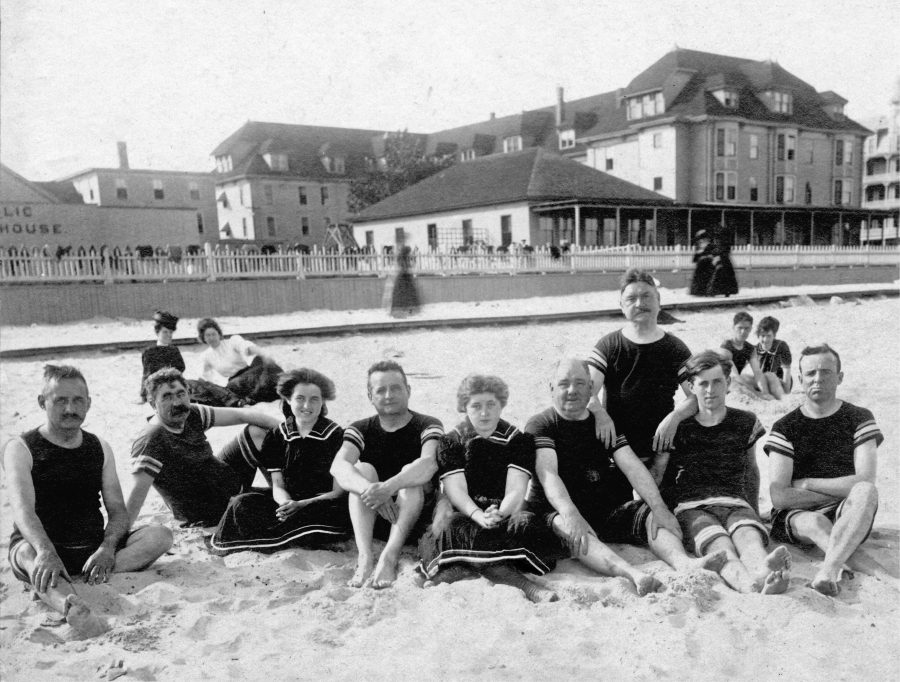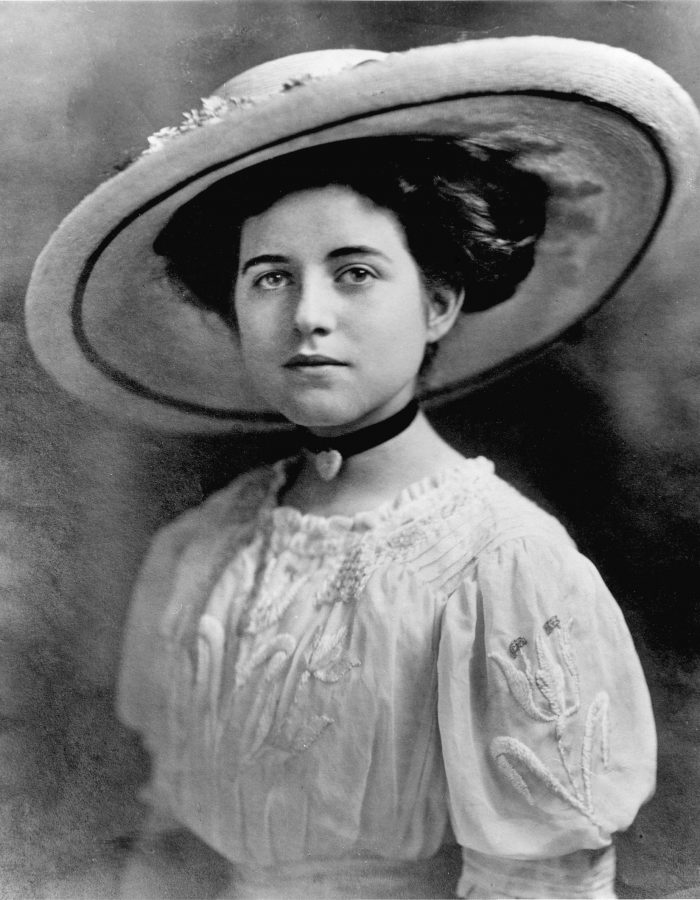
The Kennedys and the Fitzgeralds vacationing in Old Orchard Beach, Maine, in 1907. P. J. is second from left, Rose is third from left, Honey Fitz is fourth from left, and Joe is second from right.
Rose’s father had other ideas. Though a union of his daughter with Joe Kennedy would bring together two of the most prominent Irish families in Boston and generate lavish press attention, Fitzgerald frowned on the relationship. Perhaps he felt Joe wasn’t good enough for his daughter, or perhaps he sensed even then that the young man would not be a true and devoted partner. And perhaps, too, Fitzgerald’s own low-wattage rivalry with P. J. Kennedy influenced his thinking, as he seemed much more keen on another Harvard-educated Irish Catholic suitor, Hugh Nawn, the handsome son of a wealthy Dorchester contractor. (Rose liked Hugh well enough but thought he lacked Joe’s charisma.) Whatever the case, when Rose’s ardor for Joe refused to cool, Fitzgerald took a more dramatic step: in 1908 he shipped her and her sister Agnes off to a Sacred Heart convent in the Netherlands.
Her father’s decisions regarding her education frustrated Rose to no end. He had already quashed her desire to attend Wellesley College, to which she had been admitted—too secular, he determined, and besides, at seventeen she was too young to matriculate. Now he was shipping her abroad, and to a convent. Ever the dutiful daughter, however, Rose took the decisions with minimal complaint. Her letters home indicate that she profited in important ways from the experience, not least by cultivating the cosmopolitan interest she had in the world outside the United States. Her proficiency in French improved considerably, and she studied German as well. The convent’s strictly regimented schedule did not keep the two girls from traveling to various parts of the Continent and reporting home rapturously about their experiences. To her surprise, Rose found that she did not mind the devotional emphasis and strict routines of the school.63
She didn’t mention in her letters home that she kept Joe Kennedy’s photo on the table in her room, or that she missed him terribly. The feeling was mutual. For Joe, Mayor Fitzgerald’s opposition to him only sweetened the prize, only made him more determined to have what he considered the prettiest, most famous Catholic girl in the city. Upon Rose’s return to the United States in mid-1909, she and Kennedy picked up right where they had left off, though their meetings were sporadic, as Rose spent the next academic year in New York at the Academy of the Sacred Heart, a girls’ boarding school (which would become Manhattanville College).64 Only in 1910, with her return to Boston, could the romance fully resume, with carefully planned meetings in Harvard Yard, in friends’ homes, and in the Christian Science church, where no one would think to look for them. When, in January 1911, Rose had her coming-out with a splashy debut party at her parents’ home, Joe was present, as were his parents and some four hundred other guests, including every notable Democratic politician in the city. The press was there, too, of course, reporting the following day that the lovely debutante was the belle of Irish Boston, looking sublime in her white chiffon dress.65
Eventually, her father relented in his opposition to Joe Kennedy’s courtship. He could see her determination, and furthermore he had to acknowledge, however grudgingly, that Joe brought a lot of attractive attributes to the table—education, ambition, affability, good looks, and a kind of superhuman stamina that could rival Fitzgerald’s own. In addition, Kennedy was already making impressive moves in his young career. On leaving Harvard, he had set his sights high, aiming to crack Boston’s financial institutions, still tightly controlled by the Yankee Protestants. That is to say, he went into banking. From a young age and right through college, he had shown a talent for profit-making enterprises, and he grasped early on that power came from money.*2 He had a head for numbers, and had made useful contacts while at Harvard with students whose families controlled the city’s leading banks. Besides, as he later told an interviewer, “Banking could lead a man anywhere, as it played an important part in every business.”66

Rose Fitzgerald in 1911, the year of her official debut to Boston society.
Upon his graduation, in 1912, Kennedy got himself appointed as a state bank examiner, a position that allowed him to see bank records and books throughout the greater Boston area and to learn how the banks operated and made their money. From there he cleverly maneuvered his way into the presidency of East Boston’s Columbia Trust, a small bank his father had helped found in the mid-1890s. At just twenty-five, he was reportedly the youngest bank president in the state, perhaps in the country. And he was determined to make good. Commuting daily by train from the family home in Winthrop (P. J., after losing a race for street commissioner in 1908, had pulled up stakes and moved the family to a rambling home in this coastal enclave), Joe put in long hours and made use of every possible family connection to breathe new life into a trust company that had been losing assets. Often he skipped lunch or made do with crackers and milk at his desk.
Joe was popular with the immigrants who made up the bulk of the bank’s clientele. Eschewing the stodgy, standoffish reserve of many bankers, he mingled and joked with his clients, many of them poor, and earned their respect with his friendly demeanor and his efforts on their behalf. Strong personal relations with customers were key to business success, Kennedy preached to his staff, and he modeled the message. Stories were legion of his helping clients in desperate economic circumstances who had been turned down by other banks. Less commonly reported was that he always kept an eye on the bottom line—he could be as quick as any banker in calling a loan or foreclosing a mortgage.67
The strenuous efforts paid off: in short order Kennedy, an instinctive businessman for whom dealmaking came easily, boosted deposits and brought in new business for Columbia Trust. Within six months he had increased the bank’s holdings by 27 percent. Even Honey Fitz had to tip his hat.68
For his part, Fitzgerald soon had bigger things to worry about. For years, his mayoralty had been dogged by charges of corruption, with sworn testimony of payoffs and cronyism. Then, in 1913, a fellow Democrat named James Michael Curley announced that he would challenge Fitzgerald’s quest for reelection. An unscrupulous and silver-tongued demagogue, Curley, who at six feet and two hundred pounds dwarfed his opponent, learned that Fitzgerald had been carrying on with a curvaceous blond cigarette girl named Elizabeth “Toodles” Ryan, whom he’d met in a hotel bar. Curley sent a letter to Josie threatening to make the affair public if her husband did not withdraw as a candidate. When Honey Fitz refused to get out of the race, Curley announced publicly that he would give a series of high-profile lectures, including “Great Lovers in History: From Cleopatra to Toodles” and “Libertines: From Henry VIII to the Present Day.” In short order, Fitzgerald’s office announced he would not be running after all. A ditty began making the rounds: “A whiskey glass and Toodles’ ass / made a horse’s ass / out of Honey Fitz.”69
In late December 1913, newspapers began speculating about a possible engagement between Rose Fitzgerald and Joseph Kennedy. The official announcement came on June 20, 1914, after Joe presented Rose with a flawless two-carat diamond he had purchased at discount from a Harvard classmate who had entered his family jewelry business.
One week later, Franz Ferdinand, archduke of Austria-Hungary, was assassinated in Sarajevo, at the hands of a sixteen-year-old Bosnian Serb nationalist. At first, few Americans paid much attention—the crisis seemed no worse than those that had preceded it in the Balkans since 1908 and been resolved peacefully. But this time the Austrians, urged on by their ally Germany, sought to crush the Serbs for good, and the result was a cascade of events that led, in early August, to the start of the First World War. As armies across Europe mobilized, the United States, under President Woodrow Wilson, declared its neutrality, a position the nation would steadfastly maintain for another two and a half years.70
On October 7, 1914, in the midst of a war-induced financial downturn, Rose and Joe were married. Cardinal William O’Connell presided, and Honey Fitz gave the bride away. Acceding to Rose’s wishes, her parents kept the reception small (a prudent move, perhaps, in view of her father’s recent scandal), whereupon bride and groom honeymooned in Philadelphia (where they took in the first two games of the World Series between the Boston Braves and the Philadelphia Athletics) and White Sulphur Springs, West Virginia, where they spent their days riding, golfing, and playing tennis. On Sunday, October 25, they returned to Boston, and that Wednesday, the twenty-eighth, they moved to the sturdy and unassuming house on Beals Street.71
On July 25, 1915, nine months to the day after they returned from the honeymoon, Rose gave birth to the couple’s first child, Joseph Patrick Kennedy Jr. An exuberant Honey Fitz reported of his first grandson that “his mother and father have already decided that he is going to be president of the United States.”72 Twenty-two months after that, on May 29, 1917, on the heels of America’s fateful entry in the war, came child number two. His parents named him John Fitzgerald Kennedy.